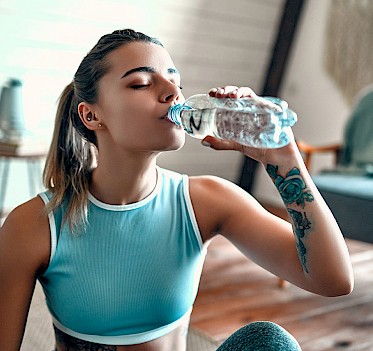Keep Cool: Avoiding Dehydration This Summer
With average temperatures in the south hovering in the 90s during the summer months, many of us are no stranger to dehydration. Dehydration is when your body loses or uses more fluid than you take in. If you don’t watch out for the warning signs and rehydrate before it becomes severe, dehydration can have long-term effects on your health.
What causes dehydration?
Excessive sweating is a common cause of dehydration. Sweat is our body’s natural, built-in cooling process—when we get hot, our sweat glands activate to release moisture from our body. When that sweat evaporates, it helps cool our skin off. But when you sweat excessively, your body can lose a lot of water. If you don’t replace it, you can easily become dehydrated. Vomiting and diarrhea can also cause your body to lose more water than it takes in, resulting in dehydration.
How does dehydration affect your body?
Our bodies are made up of about 60% water, so staying hydrated is essential for good health. Without enough water, our organs, cells, and tissues can fail to function as they should. In extreme cases, this can result in shock. Untreated dehydration can also lead to heat cramps, heatstroke, urinary and kidney problems, seizures, low blood volume, and even comas.
What are the signs of dehydration?
Signs of mild dehydration include fatigue, dry mouth, increased thirst, decreased urination, less tear production, dry skin, constipation, dizziness, lightheadedness, and headache. Keep in mind that many people don’t feel thirsty until they’re already dehydrated.
Signs of severe dehydration include excessive thirst, lack of sweat production, low blood pressure, rapid heart rate, rapid breathing, sunken eyes, shriveled skin, dark urine, sleepiness, lack of energy, confusion, irritability, and fainting.
How do you prevent dehydration?
One of the best ways to prevent dehydration is to drink plenty of fluids. The Mayo Clinic recommends that women drink about 11.5 cups of water per day and men drink about 15.5 cups per day.
If you’re on the go or it’s a hot day, you’ll want to increase your water intake. Make sure to drink water before, during and after strenuous activities or workouts, and dress cool in hot months.
If you’re having trouble getting enough water, try downloading a hydration app for your phone. These apps help you track your water intake and send you gentle reminders when it’s time to hydrate.
How do you treat dehydration?
First, treat any dehydration in young children or older adults as a medical emergency. They’re most at risk for complications due to dehydration. For most other people, mild dehydration can be treated at home. If you feel any dehydration symptoms coming on, drink fluids right away. Avoid soda, alcohol, sweet drinks, or caffeine. Fluids containing electrolytes—like Gatorade or Pedialyte for children—can help you rehydrate.
Once dehydration becomes severe, it’s a medical emergency. You’ll need to seek help at a local healthcare facility. At HealthCARE Express a medical provider will check your vital signs and look for hallmark signs of dehydration. Sometimes dehydration is so severe that drinking fluids alone can’t do the job, so fluids may be provided intravenously.
Dehydration is a common ailment, especially during hot summer months, but being proactive and making sure you drink plenty of fluids can help prevent the need for medical treatment.
If you do become severely dehydrated, the providers at HealthCARE Express can swiftly treat your symptoms and get you back on the road to hydration.
Visit our locations page to find the location nearest you!
